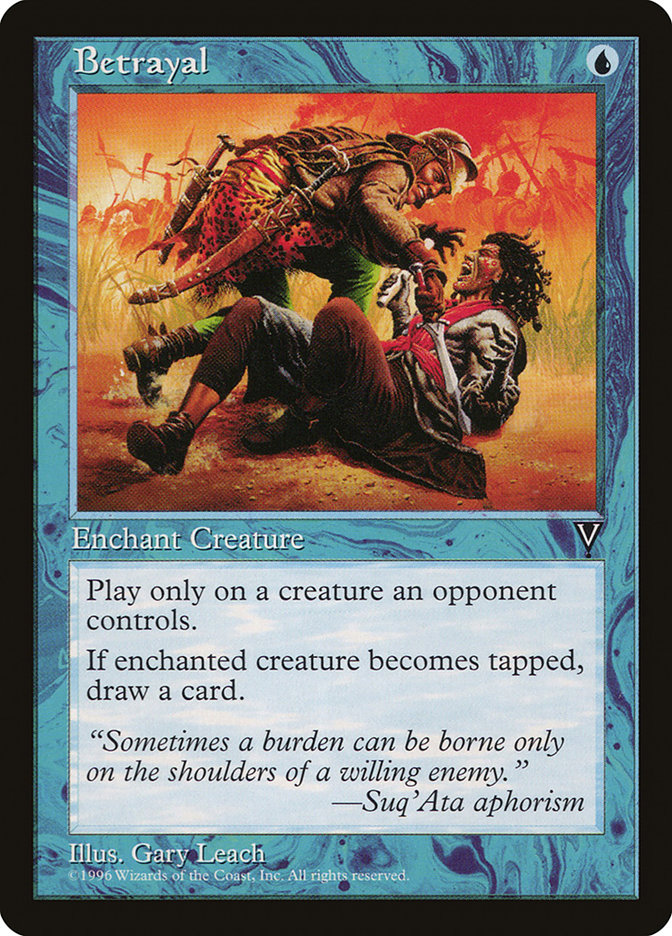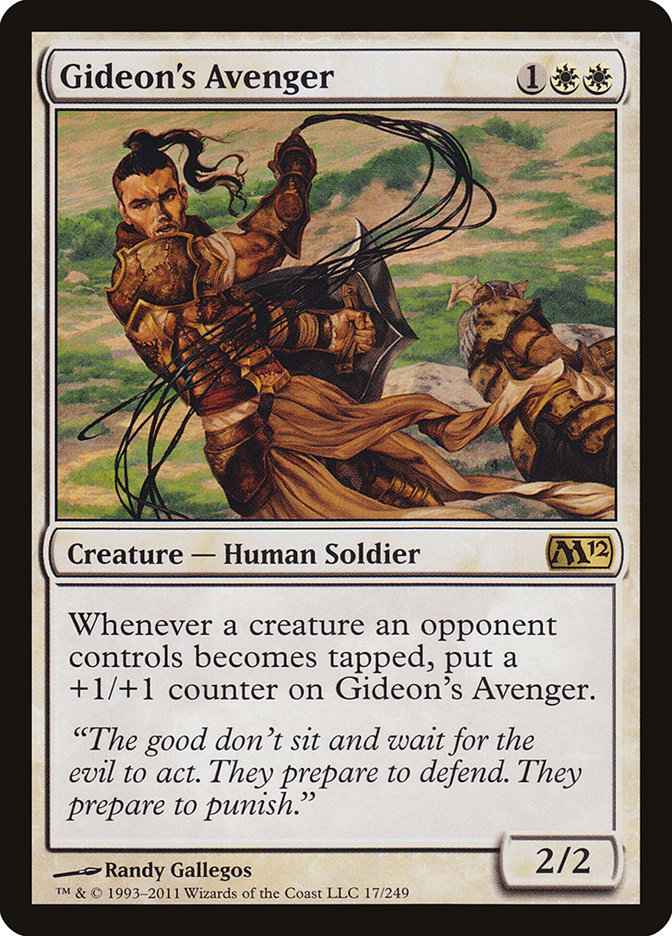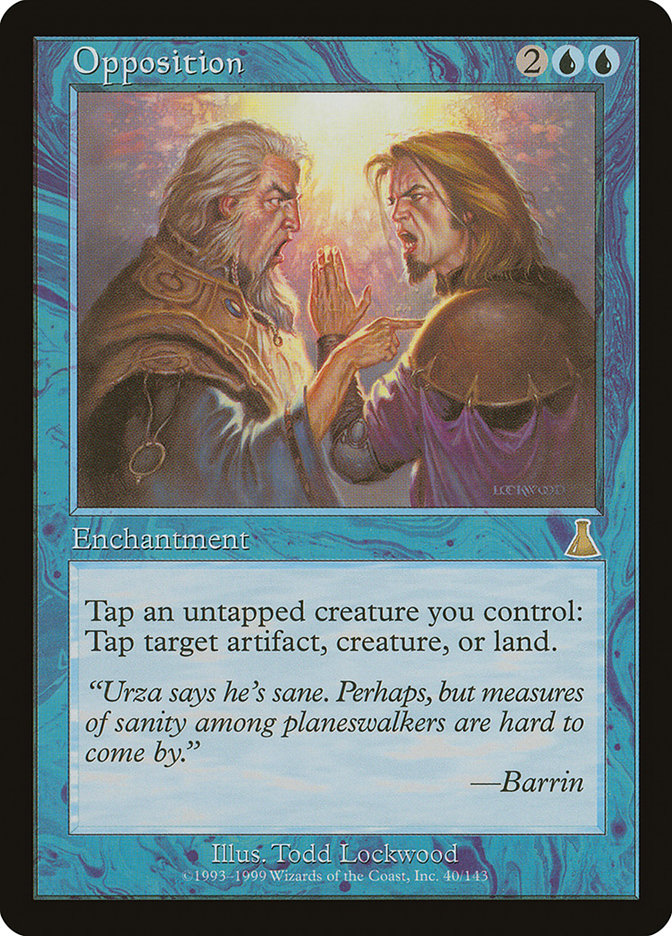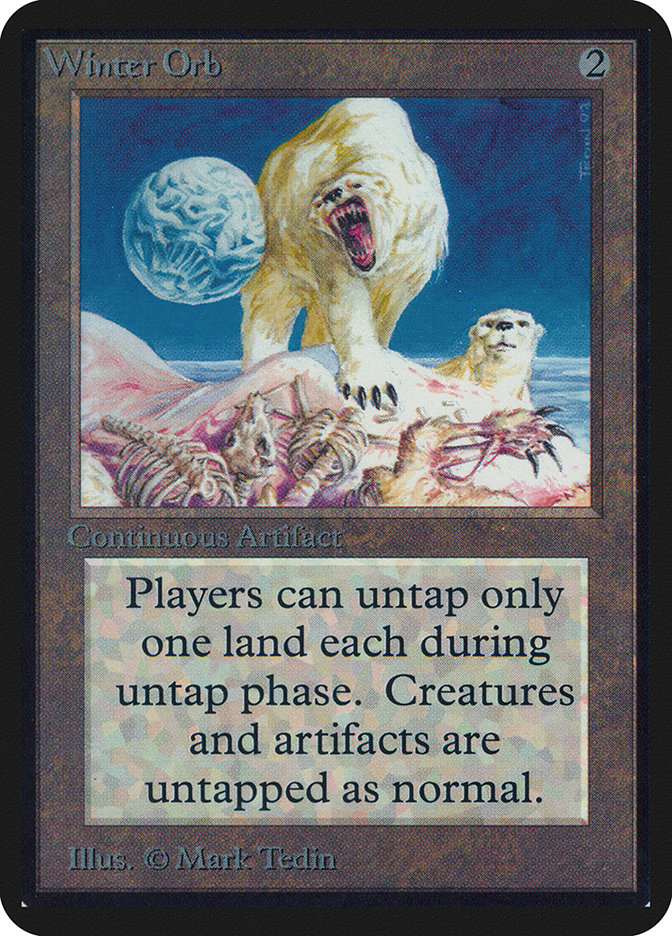Traición Carta MTG
| El coste de maná | |
| Costo de maná convertido | 1 |
| Rareza | Común |
| Tipo | |
| Habilidades | Enchant |
| Liberado | 1997-02-03 |
| Coleccione símbolo | |
| Coleccione nombre | Visions |
| Coleccione código | VIS |
| Número | 26 |
| Frame | 1997 |
| Disposición | Normal |
| Border | Negra |
| Ilustrado por | Gary Leach |
Texto de la carta
Juega solo en una criatura que controla un oponente. Si la criatura encantada se endereza, roba una carta.
"A veces una carga solo puede ser soportada en los hombros de un enemigo dispuesto." —Aforismo Suq'Ata
Cartas Similares
El panorama de cartas de control en Magic: The Gathering es diverso, con Betrayal ofreciendo un giro distintivo en esta arena. Al comparar Betrayal con sus contrapartes, resulta interesante observar su sinergia con encantamientos que hacen que las criaturas se enderecen. Gideon's Avenger es una criatura que se vuelve más fuerte por cada criatura enderezada que controlan tus oponentes, lo cual podría funcionar en conjunto con el mecanismo de Betrayal de robar una carta cuando una criatura del oponente se endereza.
Otro paralelo se puede establecer con Opposition, una carta que permite enderezar criaturas para enderezar otros permanentes. Aunque Opposition en sí no roba cartas, el control que ejerce sobre la partida puede complementarse con la habilidad de Betrayal de recompensarte por cada criatura enderezada que controle tu oponente. Winter Orb también comparte un dominio similar al mantener los recursos del oponente a raya al permitirles enderezar solo un terreno durante su fase de enderezar, lo que, en combinación con Betrayal, podría llevar a una ventaja consistente en cartas.
En comparación, Betrayal fomenta un enfoque más proactivo hacia el control; al robar cartas, no solo obtienes beneficios inmediatos sino también ventajas a largo plazo al aumentar tus opciones y recursos. Esto posiciona a Betrayal como una carta potencialmente formidable en mazos construidos en torno a mecanismos de enderezamiento y estrategias de control continuas.
Pros de la carta
Ventaja de cartas: La carta de Traición puede crear cambios decisivos en el poder al permitirte tomar temporalmente el control de una criatura del oponente. Esto no solo les priva de un activo valioso, sino que potencialmente añade uno a tu lado del campo de batalla, inclinando la balanza a tu favor durante turnos críticos.
Aceleración de recursos: Al tomar el control de una criatura del oponente, obtienes efectivamente los recursos que invirtieron en conjurarla. Esto podría significar beneficiarte de una fuerza de ataque adicional, capacidades defensivas u otras habilidades sin el costo de maná típico asociado con desplegar esa criatura desde tu mano.
Velocidad instantánea: La Traición se puede lanzar a velocidad instantánea, proporcionando la ventaja estratégica de sorpresa y flexibilidad. Esto te permite reaccionar a los movimientos de tu oponente en su turno, potencialmente alterar el curso del combate o aprovechar una debilidad temporal sin revelar tus intenciones de antemano.
Contras de la carta
Requisito de descarte: Lanzar Traición te obliga a desprenderte de otra carta de tu mano, lo que podría dejarte en desventaja si luchas por mantener la ventaja de cartas o te enfrentas a un oponente que aplique tácticas de presión de mano.
Costo de maná específico: Traición no solo requiere una inversión genérica de maná, sino una combinación precisa de tipos de maná. Este requisito puede ser difícil de cumplir en un apuro, especialmente en mazos multicolores que no siempre tienen disponible el maná requerido.
Costo de maná comparativamente alto: Con un costo de maná que roza el lado más alto de su categoría, Traición compite con otras cartas dentro del mismo rango de maná que pueden proporcionar ventajas más inmediatas o impactantes en el campo de batalla, lo que la convierte en una opción menos óptima para estrategias rápidas o conservadoras en maná.
Razones para incluir Traición en tu colección
Versatilidad: Traición ofrece una amplia gama de aplicaciones en varios tipos de mazos, especialmente aquellos que utilizan estrategias de lanzamiento de hechizos o control, donde robar cartas y conocer los planes del oponente agrega un valor significativo.
Potencial de combo: Esta carta tiene interacciones sinérgicas en mazos donde manipular o beneficiarse del comportamiento del oponente es clave. También se puede combinar con cartas que se activan con lanzamientos de hechizos o acciones enemigas para obtener ventajas incrementales.
Relevancia en el meta: En entornos que favorecen juegos prolongados o donde es probable que los oponentes lancen numerosos hechizos, incluir Traición puede mejorar tu capacidad para mantener el impulso y la ventaja de recursos a lo largo de la partida.
Cómo vencer
Enfrentar el desafío táctico presentado por Traición puede ser una prueba fascinante de habilidad para cualquier jugador. Esta carta única permite a su controlador beneficiarse de los hechizos del oponente, potencialmente cambiando el curso de un juego. Para superar esta ventaja, considera utilizar cartas con protección hexproof u habilidades protectoras similares que resguarden tus hechizos y tu estrategia. Además, las tácticas que limitan el número de hechizos que cada jugador lanza por turno pueden mitigar el impacto de Traición. Al ser consciente de la presencia de la carta y ajustar tu estilo de juego en consecuencia, desactivar la ventaja de Traición se convierte en una tarea manejable.
Eliminar directamente Traición del juego también se encuentra dentro de las contraestrategias efectivas. Uno podría buscar hechizos de eliminación rápida o habilidades que se ocupen de encantamientos en el tablero. El color verde, por ejemplo, ofrece efectos de naturalización que pueden desmantelar Traición antes de que su efecto completo se materialice. Por lo tanto, aunque Traición presenta un elemento de interrupción a los patrones de juego convencionales, elecciones de cartas precisas y un enfoque reflexivo en la partida pueden asegurar que tales molestias sean solo un contratiempo menor en el camino hacia la victoria.
En esencia, adaptarse a la influencia de Traición requiere un equilibrio entre una construcción inteligente de mazos y un juego estratégico, asegurando que su efecto no decida el resultado de tu partida. A través de una consideración cuidadosa y las contra medidas adecuadas, derribar una estrategia unida con Traición no es solo una fantasía, ¡es un triunfo al alcance!
Donde comprar
Si estás buscando comprar una carta MTG Traición de un coleccione específico como Visions, existen varias opciones confiables que debes considerar. Una de las fuentes principales es tu tienda de juegos local, donde a menudo puedes encontrar paquetes de refuerzo, cartas individuales y mazos preconstruidos de colecciones actuales y pasadas. A menudo ofrecen el beneficio adicional de una comunidad donde puedes intercambiar con otros jugadores.
Para un inventario más amplio, particularmente de colecciones más antiguos, mercados en línea como TCGPlayer, Card Kingdom y Card Market ofrecen amplias selecciones y te permiten buscar cartas de colecciones específicos. Las plataformas de comercio electrónico más grandes como eBay y Amazon también tienen listados de varios vendedores, lo que puede ser un buen lugar para buscar productos sellados y hallazgos raros.
Además, el sitio oficial de Magic suele tener un localizador de tiendas y listas de minoristas para encontrar Wizards of the Productos con licencia costera. Recuerde comprobar la autenticidad y el estado de las cartas al comprarlas, especialmente a vendedores individuales en mercados más grandes.
A continuación se muestra una lista de algunos sitios web de tiendas donde puede comprar las Traición y otras cartas MTG:
 COMPRAR
COMPRAR BurnMana es un socio oficial de TCGPlayer
- eBay
- Card Kingdom
- Card Market
- Star City Games
- CoolStuffInc
- MTG Mint Card
- Hareruya
- Troll and Toad
- ABU Games
- Card Hoarder Magic Online
- MTGO Traders Magic Online
Ver productos MTG
Legalidades
Formatos de Magic the Gathering donde Traición tiene restricciones
| Formato | Legalidad |
|---|---|
| Commander | Legal |
| Legacy | Legal |
| Paupercommander | Legal |
| Oathbreaker | Legal |
| Pauper | Legal |
| Premodern | Legal |
| Vintage | Legal |
| Duel | Legal |
| Predh | Legal |
Reglas e información
La guía de referencia para las reglas de las cartas Traición de Magic: The Gathering proporciona las reglas oficiales, las erratas emitidas, así como un registro de todas las modificaciones funcionales que se han producido.
| Fecha | Texto |
|---|---|
| 04/10/2004 | Si alguna vez encanta a una criatura que no está controlada por un oponente del controlador de Traición, entonces se coloca en el cementerio como una Acción Basada en el Estado. |



